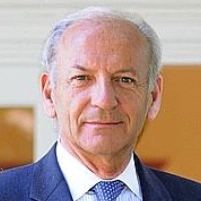Glaxo Agrees to Pay Record $3 Billion Settlement for Fraud and Hiding Drug Safety Data
Thursday, July 05, 2012
 Jean-Pierre Garnier, CEO of GSK during its worst abuses
Jean-Pierre Garnier, CEO of GSK during its worst abuses
In a year of billion-dollar settlements involving drug manufacturers, GlaxoSmithKline (GSK) has topped them all. The British pharmaceutical company has agreed to pay a record amount—$3 billion—to resolve criminal charges for promoting its best-selling antidepressants for unapproved uses and failing to report safety data about Avandia, a much-prescribed diabetes drug. Also, the deal settles lawsuits stemming from improper marketing of six other medications.
Of the $3 billion GlaxoSmithKline will pay, nearly $1 billion represents a criminal fine for illegally marketing and promoting several popular products for uses not approved by the Food and Drug Administration (FDA). The remaining $2 billion will go towards settling allegations from states and the federal government that the company illegally sold and marketed some of its products.
Most of GlaxoSmithKline’s legal troubles involved the drugs Paxil, Wellbutrin, Avandia.
According to the Justice Department, “from April 1998 to August 2003, GSK unlawfully promoted Paxil for treating depression in patients under age 18, even though the FDA has never approved it for pediatric use.” In addition, “GSK sponsored dinner programs, lunch programs, spa programs and similar activities to promote the use of Paxil in children and adolescents. GSK paid a speaker to talk to an audience of doctors and paid for the meal or spa treatment for the doctors who attended.”
The government also contends that “from January 1999 to December 2003, GSK promoted Wellbutrin, approved at that time only for Major Depressive Disorder, for weight loss, the treatment of sexual dysfunction, substance addictions and Attention Deficit Hyperactivity Disorder, among other off-label uses, and that “GSK paid millions of dollars to doctors to speak at and attend meetings, sometimes at lavish resorts, at which the off-label uses of Wellbutrin were routinely promoted and also used sales representatives, sham advisory boards, and supposedly independent Continuing Medical Education (CME) programs to promote Wllbutrin for these unapproved uses.”
As for Avandia, “GSK failed to include certain safety data about Avandia, a diabetes drug, in reports to the FDA that are meant to allow the FDA to determine if a drug continues to be safe for its approved indications and to spot drug safety trends. The missing information included data regarding certain post-marketing studies, as well as data regarding two studies undertaken in response to European regulators’ concerns about the cardiovascular safety of Avandia.”
The settlement also covered promoting unapproved uses of the asthma drug Advair, the anti-epileptic medication Lamictal, and the post-operative anti-nausea drug Zofran. “GSK paid kickbacks to health care professionals to induce them to promote and prescribe these drugs as well as the drugs Imitrex, Lotronex, Flovent and Valtrex. The United States alleges that this conduct caused false claims to be submitted to federal health care programs.”
The record settlement comes in the same year as Johnson & Johnson’s $2 billion fine for off-label promotion of the antipsychotic drug, Risperdal, and Abbott Laboratories’ $1.6 billion agreement over its marketing of the antipsychotic drug Depakote.
All of the settlements have one thing in common: No executives were charged with a crime. Critics say the large monetary penalties are not enough to dissuade Big Pharma from continuing to break the law. For example, although $3 billion may seem like a big blow to GSK, during the years in question, the company sold $11.6 billion worth of Paxil, $10.4 billion worth of Avandia and $5.9 billion worth of Wellbutrin. As Patrick Burns of the whistleblower advocacy group Taxpayers Against Fraud told The New York Times, “a $3 billion settlement for half a dozen drugs over 10 years can be rationalized as the cost of doing business.”
“What we’re learning is that money doesn’t deter corporate malfeasance,” Eliot Spitzer, New York’s former attorney general who sued GlaxoSmithKline in 2004, told the Times. “The only thing that will work in my view is C.E.O.’s and officials being forced to resign and individual culpability being enforced.”
Part of the settlement, about $250 million, will go to four whistleblowers, Greg Thorpe, Blair Hamrick, Thomas Gerahty and Matthew Burke, who worked for GSK and faced financial hardship after they reported the company’s misconduct nine years ago.
-David Wallechinsky, Noel Brinkerhoff
To Learn More:
GlaxoSmithKline to Plead Guilty and Pay $3 Billion to Resolve Fraud Allegations and Failure to Report Safety Data (Department of Justice)
Glaxo Agrees to Pay $3 Billion in Fraud Settlement (by Katie Thomas and Michael Schmidt, New York Times)
Glaxo Whistleblowers to Share $250m Windfall (by Richard Blackden, The Telegraph)
Glaxo, A Whistleblower & A Missed Opportunity (by Ed Silverman, Pharmalot)
GlaxoSmithKline Concludes Previously Announced Agreement in Principle to Resolve Multiple Investigations with US Government and Numerous States (GlaxoSmithKline)
GlaxoSmithKline Sets Aside $3.4 Billion to Cover Legal Costs (by Noel Brinkerhoff, AllGov)
Glaxo to Pay $750 Million over Tainted and Ineffective Drugs (by Noel Brinkerhoff, AllGov)
Glaxo Pays Out $1 Billion in Birth Defect Cases with 600 Lawsuits to Go (by Noel Brinkerhoff, AllGov)
- Top Stories
- Unusual News
- Where is the Money Going?
- Controversies
- U.S. and the World
- Appointments and Resignations
- Latest News
- Trump Orders ICE and Border Patrol to Kill More Protestors
- Trump Renames National Football League National Trump League
- Trump to Stop Deportations If…
- Trump Denounces World Series
- What If China Invaded the United States?






Comments